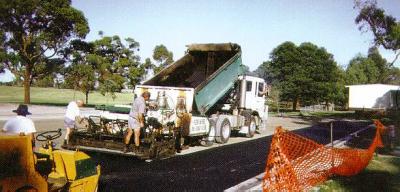Driveway Paving
Part of owning a home is that eventually the driveway will have to be replaced. Paving, however, is a complicated process unfamiliar to most, and not all paving contractors are created equal. We've created this page to help our residents make sure that they get what they pay for. Here are some simple guidelines to follow
- A good driveway starts with 12" of crushed gravel graded and compacted. Make sure the driveway is graded to avoid water problems
- Clean cut, straight joints are needed to tie into roads and sidewalks. Blending the pavement with bad or no joints will result in the end of the driveway peeling aways from existing pavement.
- At least 3" of hot mix machine in place asphalt are needed for a good strong driveway. Don't be afraid to go out with a ruler to measure the depth of asphalt they're paving
- Make sure the asphalt is well compacted with a roller and that open sides are compacted with hand tamps and special asphalt shoes
- After they're finished make sure the driveway drains the way you want it to. Test with a garden hose!
- Most important is to have these stipulations in the written contract you sign. It's the only way to ensure accountability!
- Wait about 2 years before sealing your driveway. There is too much oil on a brand new driveway. It needs time to cure and weather first.

